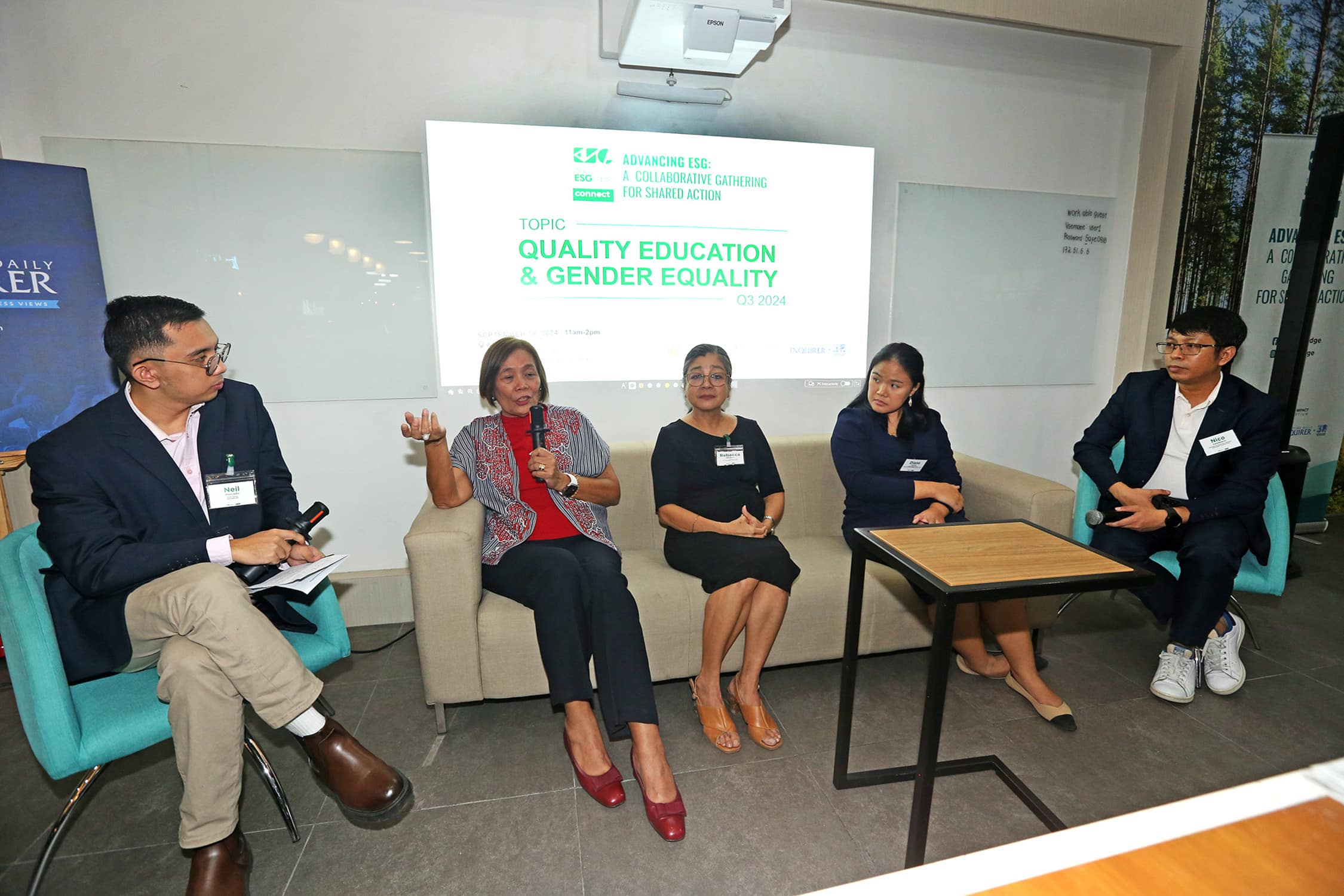
SHARED CHALLENGES The primary Inquirer ESG Edge discussion board and assembly with program companions on Sept. 18 featured talks by 4 consultants in training and gender sensitivity. —Eugene Araneta
MANILA, Philippines — Lack of funding and the persevering with want for reforms within the training system are among the many urgent considerations requiring a direct, holistic response from the private and non-private sectors.
In a latest discussion board hosted by the Inquirer, the primary underneath its ESG Edge initiative, one of many options proposed was for the federal government to additional “decentralize” its features and “delegate” extra of them to non-public colleges.
It could actually begin with the growth of the present voucher system of the Division of Training which, within the course of, may also help cut back perennial classroom scarcity, in accordance with Diane Fajardo, deputy govt director of the Philippine Enterprise for Training (PBEd).
READ: Training’s basic points
Many non-public colleges, Fajardo famous, have lecture rooms and services which can be truly greater than sufficient for his or her college students.
Article continues after this commercial
“You’ve got so many [public] colleges missing lecture rooms, [or making do] with dilapidated lecture rooms, with not sufficient academics. However you even have non-public colleges with lecture rooms, many buildings, studying programs—with not so many enrollees,’’ she stated.
Article continues after this commercial
“Whereas there’s a lack of lecture rooms [in public schools], why not permit the non-public colleges to take over a few of these duties within the meantime?” Fajardo added.
At current, the Division of Training’s voucher system covers solely senior highschool college students, permitting them to enroll in non-public colleges.
There’s a invoice pending in Congress—and supported by PBEd—to incorporate extra college students in decrease ranges all the way down to kindergarten among the many voucher recipients, she stated.
Whereas new lecture rooms have but to be constructed, “why not let the non-public sector deal with these college students?’’ she stated.
“It’s authorities cash and mainly you’re delegating the duties on training to the non-public sector. [And] the federal government nonetheless has accountability over non-public colleges contemplating its mandate to make sure all kids [exercise their] proper to fundamental training.”
Traders’ yardstick
The Inquirer ESG Edge initiative seeks to advertise ESG (which stands for “environmental, social and governance” rules).
ESG is taken into account a yardstick by which non-public corporations may be evaluated by potential buyers based mostly on their adherence to sound enterprise practices, transparency and sensitivity to their group.
The ESG Edge discussion board held on Sept. 18 additionally served because the paper’s first basic assembly with its program companions from the enterprise sector, academe and civil society.
“Our ethical obligation is to teach the folks,” stated one other speaker, Nico Candelaria, training and governance innovator for the Asian Institute of Administration-Circularity Membership 22.
“In keeping with the Structure, training will get the most important share of the pie, however the query is: How massive is that portion of the pie when it comes to our GDP (gross home product)?” he requested.
Problem to media
At current, the nationwide funds for training equals solely 3.6 p.c of the GDP, in accordance with a research by the Philippine Institute for Growth Research, nonetheless decrease than the usual set by the United Nations which is 4 to six p.c.
In actuality, Candelaria stated, the protection sector at all times will get the most important share of the funds, together with public works.
Additionally talking on the discussion board, Rebecca Padilla-Marquez of the Communication and Ladies’s Research departments of St. Scholastica’s Faculty referred to as for deeper media protection of training and well being points to encourage stronger stakeholder involvement.
“All problems with well being and training must also be within the entrance pages. So there must be a shift to what we discover necessary,” she additionally stated.
Aurora Geotina-Garcia of the Administration Affiliation of the Philippines spoke of how poor entry to training contributes to generational poverty.
Suiee Suarez, who joined the viewers as vp for company affairs of Aboitiz Energy, the displays made by the audio system through the discussion board in regards to the dire standing of Philippine training would nonetheless strike the enterprise group as an “eye-opener.”
“For us to handle the issue, I imagine we’ve got to grasp what the issue is,” Suarez stated in an interview. “To vary these, all these should be acknowledged as systemic.’’

